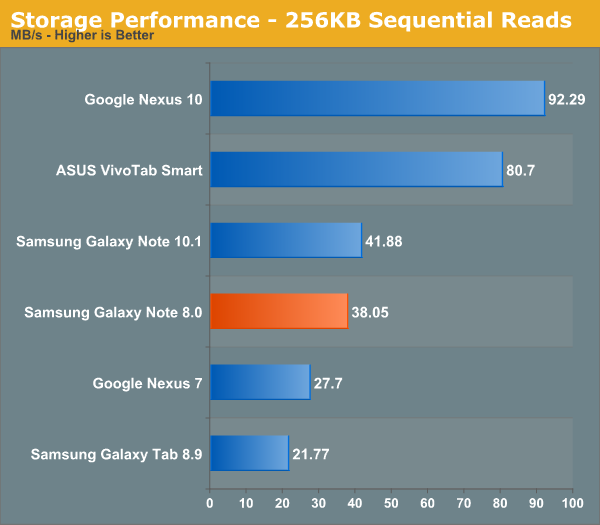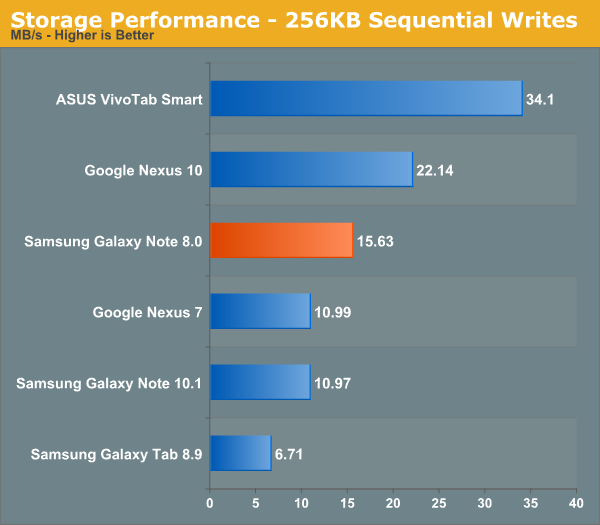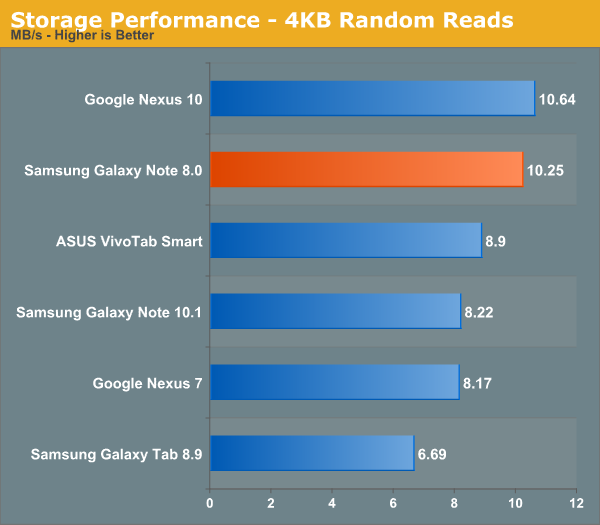Samsung Galaxy Note 8.0 Review
by Anand Lal Shimpi on April 17, 2013 11:29 PM EST- Posted in
- Tablets
- Samsung
- Android
- Mobile
- Galaxy Note 8.0
NAND Performance
Given one of my obsessions over the past 5 years, focusing on NAND performance in modern smartphones and tablets is an obvious fit. For these tests we turn to Androbench, using a modified version of the default performance settings. By upping the read/write buffer to 100MB we get more repeatable results, which is always nice to have. Just as in our PC SSD reviews, we focus on large block sequential read/write performance as well as small file random access. For Windows 8 tablets, we use Crystal Disk Mark as a rough comparison point. Note that we are looking at peak performance here and not sustained write speeds. I don't even want to know how slow these things will get if exposed to prolonged random writes. I've toyed with worst case performance on modern iOS and Android mobile devices and it's not pretty. For now, just try not to fill these things up.
The Galaxy Note 8.0's peak sequential performance is ok, the Nexus 10 does far better. Random IO performance however is great (for an ARM based tablet). The latter is very important for IO heavy multitasking workloads, which could be why we're seeing a mild focus on it here. Random write performance is still lower than I'd like to see (realistically we need to be about an order of magnitude better than where we are for real IO intensive multitasking), but the Note 8.0 at least ends up near the top of these charts.
If you look at the Note 10.1's performance you'll notice a big difference in random IO performance. It's entirely possible that Samsung is using a better controller/firmware combination in the Note 8.0, or it could be that my review sample happened to source a better eMMC solution. NAND based storage is typically treated like a commodity by most OEMs, so I wouldn't be too surprised to see wide variation in performance depending on how well you do in the eMMC lottery.













95 Comments
View All Comments
teiglin - Thursday, April 18, 2013 - link
I'm not sure there's a reasonable compromise there, though, without increasing size pretty substantially. Even APQ8064 at 1.5GHz is going to blow through the <20Whr of battery one can fit in a chassis designed for a 7" screen very quickly, not to mention the higher draw of a denser display. Unfortunately, the reality of the OS situation means that Google lacks the luxury Apple has of running a lower-clocked CPU, so when it comes to gaming, the only way to save battery is to run games that look worse or wait for better silicon (or better battery technology, though I don't have the impression that's improving very fast).I'm curious what your target battery life is for this sort of thing. I mean, four hours is a long time to be gaming away from a power source; it's within spitting distance of long enough for a cross-country flight (sorry, US-centric here), and when travelling, I tend to have a USB battery on hand anyway.
MonkeyPaw - Thursday, April 18, 2013 - link
I suppose my thoughts are based on my first tablet, the Iconia A500. Battery life was crazy long on everything. I think I plugged it in once or twice a week, when it seems like my Nexus 7 gets plugged in almost everyday. Most days, I don't even game that long.More directly to your question, I don't have a major complaint about the Nexus 7's battery life, but I would rather see batter life improve next release as opposed to getting worse. I don't feel that the general performance of the device is bad in any way, so it seems like a more efficient SOC that performs slightly better is all that is required. Provided they don't increase DPI, of course.
Hung_Low - Thursday, April 18, 2013 - link
What is the GPS app used for the review? Seems to be very popular amongst the tech communitythebigfudge - Thursday, April 18, 2013 - link
I found it: https://play.google.com/store/apps/details?id=com....mayankleoboy1 - Thursday, April 18, 2013 - link
The only problem i see is the last generation hardware.mayankleoboy1 - Thursday, April 18, 2013 - link
Just to add, why would anyone not buy the Nexus 10 ?StormyParis - Thursday, April 18, 2013 - link
Size. Pen. SD.lmcd - Thursday, April 18, 2013 - link
Exynos 4 Quad is definitely in the good enough range.Spunjji - Friday, April 19, 2013 - link
It's probably a bit above that, being entirely honest. Tends to sit near the top end of benchmarks. Quad Krait / A6 is definitely better, but not a lot else.Spunjji - Friday, April 19, 2013 - link
Oh no, so slow./sarcasm